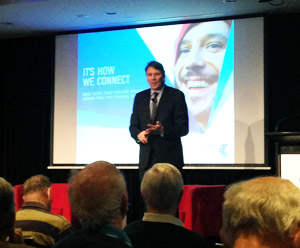Telstra's disconnect with mum and dad investors

When your company has invested close to a billion dollars in cloud computing, and a room of shareholders goes silent when you ask what cloud computing is, it might be the time to panic. But the mum and dad Telstra investors seem to place a lot of trust in CEO David Thodey.

(Credit: Josh Taylor/ZDNet)
Thodey and CFO Andy Penn met with a small number of retail shareholders in Sydney yesterday, for an informal meeting ahead of the Annual General Meeting (AGM) next month. The crowd of no more than 100 people, mostly elderly retirees, were greeted by young, energetic-looking staff dressed rather dapperly in the new plaid Telstra retail outfits on the second floor of the Hilton yesterday afternoon. After milling through the crowd, Thodey and Penn took to the stage to deliver short speeches on where the company was at, before turning to questions for 90 minutes.
Telstra shareholders are like no other you will find in Australia. Under the Howard government, the then-government-owned Telstra was privatised, with the government pitching the shares as ideal for "mum and dad" investors.
It was seen as a good investment at the time. It was a solid investment in a company that had a monopoly in fixed line infrastructure, and mobile phones and the internet had barely taken off when the first round of shares went on sale in 1999. But 13 years down the track, a CEO that didn't work well with government, an overpriced network and loads of unhappy customers sent the share price down, and it has never fully recovered. Under Thodey's leadership, Telstra has brought close to three million customers to its mobile network through undercut prices and promises of improved customer service. The company's share price has started to improve, too. But it has a long way to go.
Today, around 40 percent of Telstra's shareholders are the so-called mum and dad investors, while around 60 percent are institutional investors. While Telstra's official AGM is much larger and a much more formal affair, Thodey said that the company decided to keep the special retail shareholders meetings that the company had started in 2011 to explain the National Broadband Network (NBN) deal, because it was a good way to get in touch with the retail shareholders.
Thodey kicked off the event by first talking about the company's investments in cloud computing. When he didn't get much of a response, he asked whether anyone in the room had an iPhone.
He didn't have much luck there, either.
"Who uses an iPhone here? Oh, you need to get with it, guys," he joked. "Apple is the largest company in the world now. It is very important for you to understand for Telstra, because this is where we generate a lot of revenue and a lot of business."
"You've got Samsung and Apple, and young people today, they just live on these things. They don't read newspapers, they will go and use a tablet or a smartphone to read the information. People are changing the way they live, and it is about being connected."
When it turned to questions, only two or three of the questions directly related to shares or dividends. The shareholders gathered today just wanted a few things explained to them.
"I'm pretty old, and I've got a landline phone and I believe the landlines are on the way down. And I just wonder how long they're going to last for, before they go out all together," the first questioner asked.
This question came up a number of times. Thodey insisted that Telstra had no plans to do away with fixed line services any time soon. One questioner just wanted a better way to speak to customer service, but admitted that he was a loyal customer of Telstra's.
"Back 60 odd years ago, we had to build our own telephone line, and I've been with Telstra ever since. I must say things are a bit better today than they were then."
Many questions were about offering cheaper services to seniors, or wanting pamphlets to explain technology to them. One was quite adamant on getting a pamphlet when Thodey suggested he could visit a website. Another admitted that she felt intimated by the "IT whiz kids" in Telstra shops, and suggested there should be more programs to help seniors with technology. A lady who had difficulty understanding predictive text on her mobile phone pleaded with Thodey to keep seniors in mind as the company races ahead into the 21st century.
"The thing is, our memory goes a little bit [and] when I try to click on things, it doesn't work the way I was told it would work."
While it is easy to brand these shareholders as luddites or the Grandpa Simpsons of the world, wanting to tell everyone about the time they set the toaster to three-medium-brown, these are people who trusted former Prime Minister John Howard when he said it was good to invest in Telstra. It was their telephone company. The telephone boxes they saw on the street corner. It wasn't a "computer" company, as one shareholder said yesterday. And it's not that they're angry with the direction the company is taking them; they just want to understand it.
And Thodey's appears to get that.
"We very much appreciate the value of our seniors and wiser people in the community," he said.